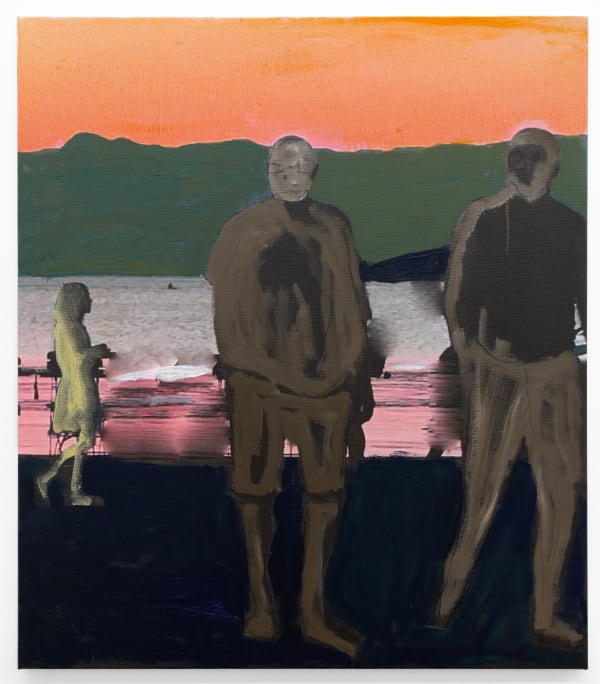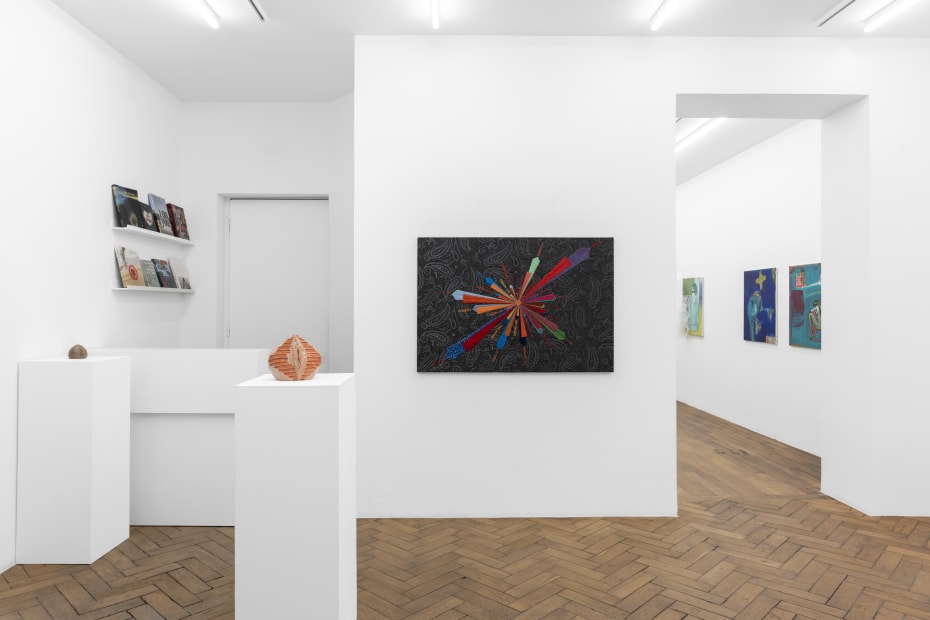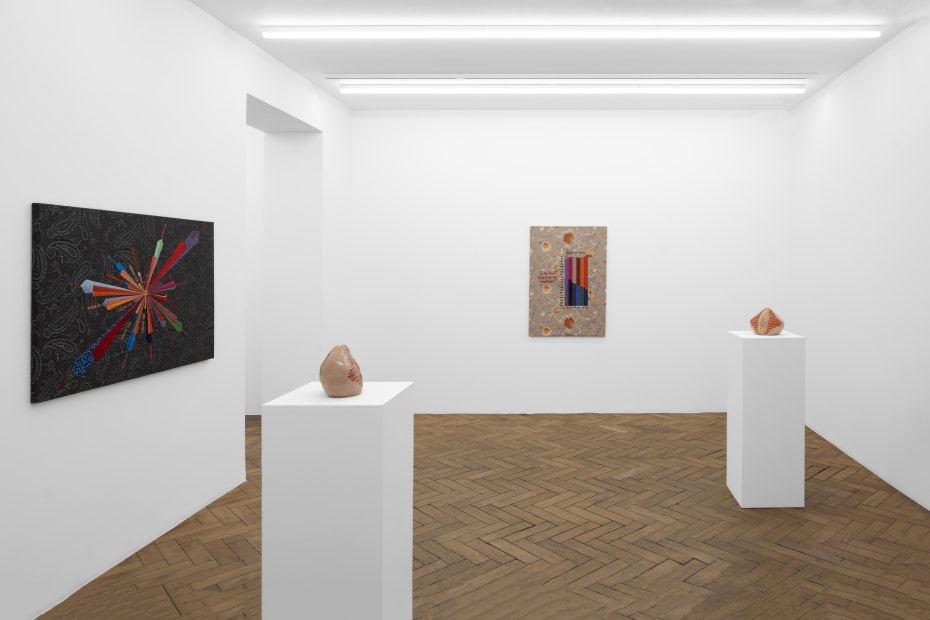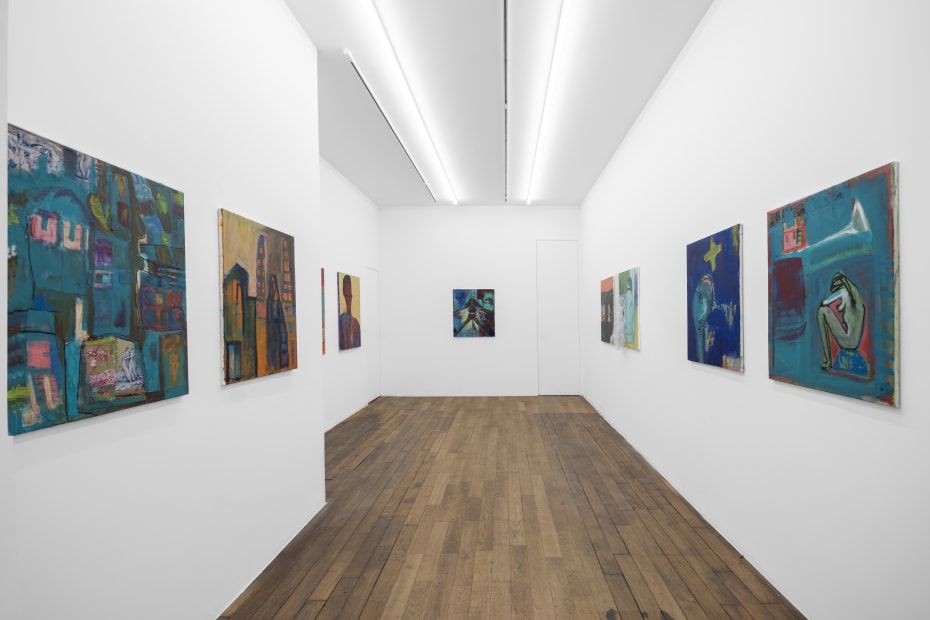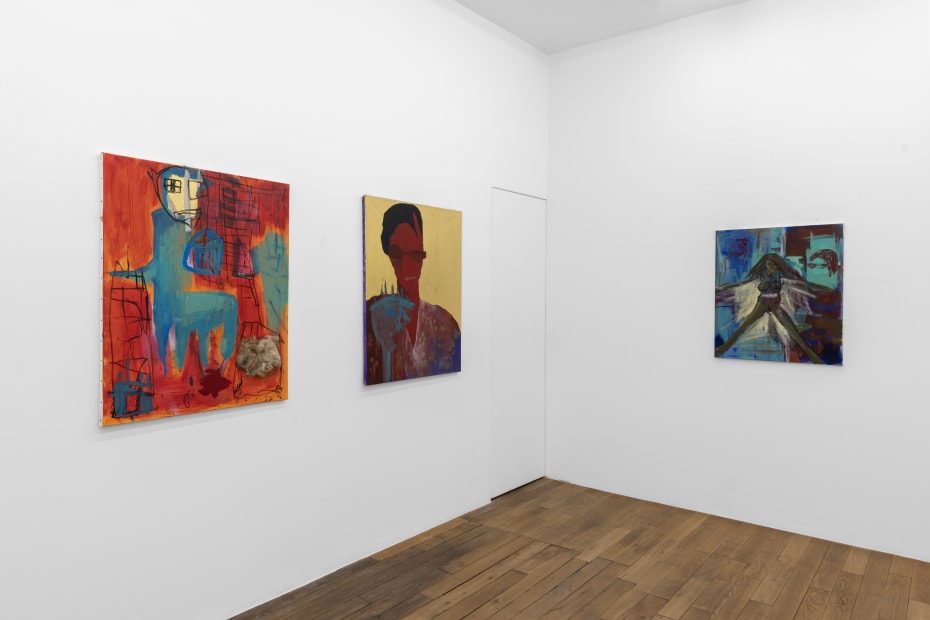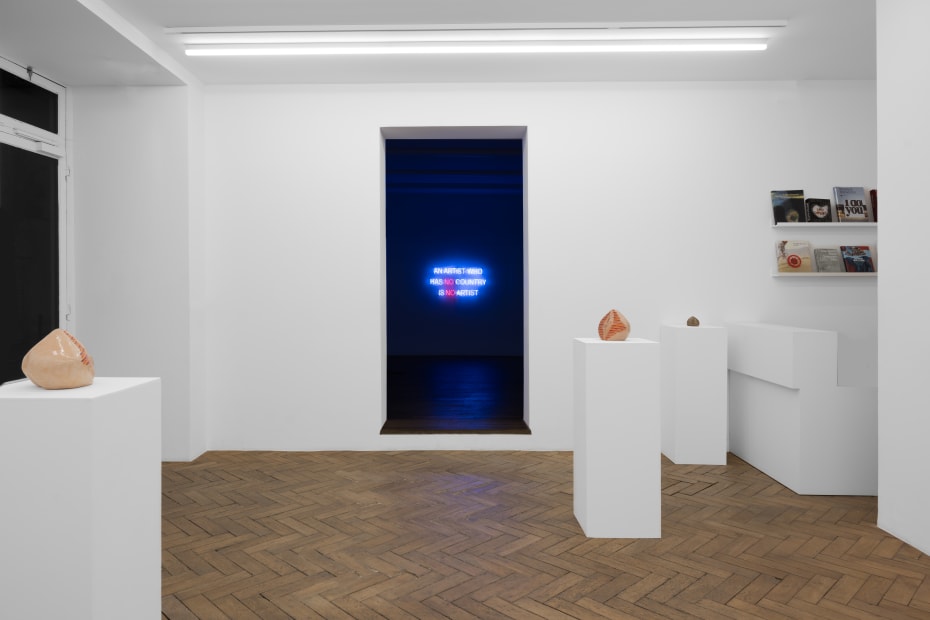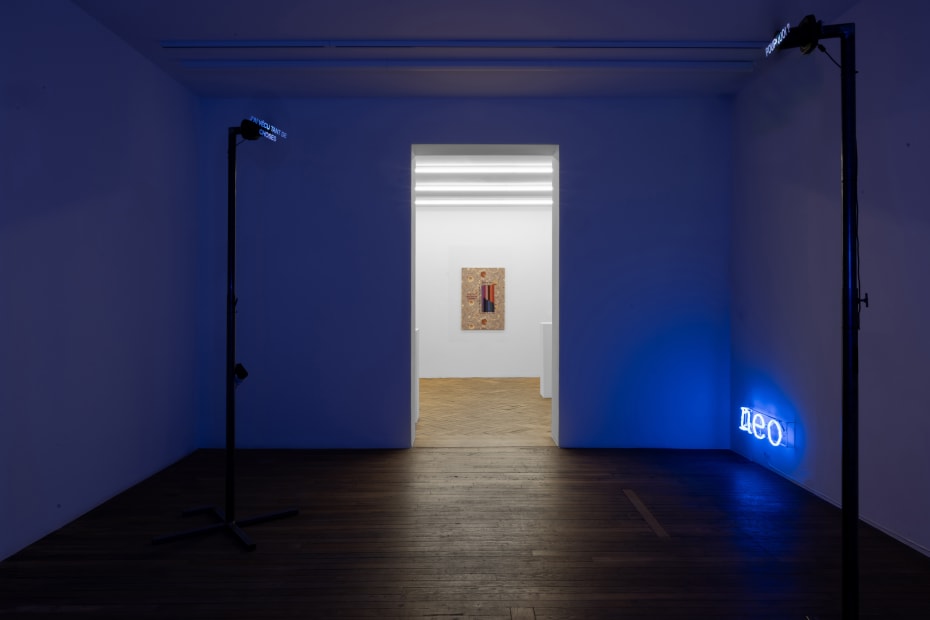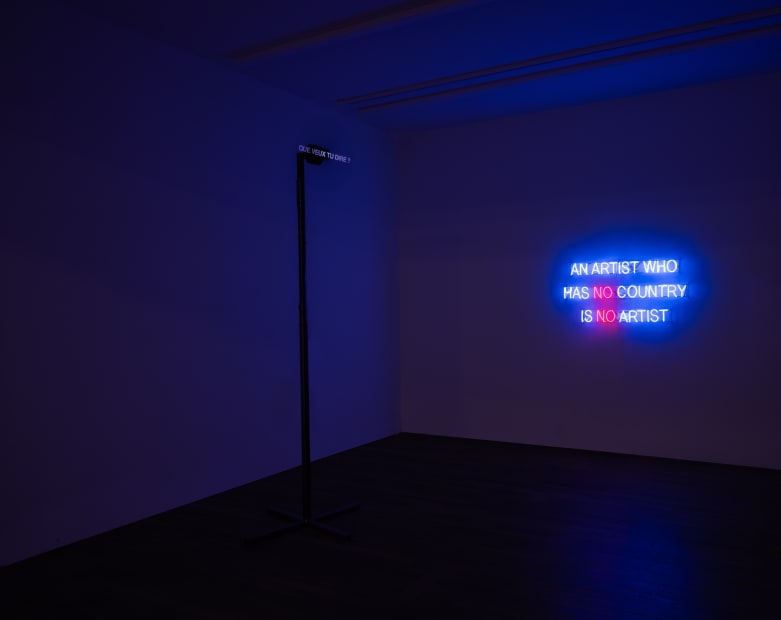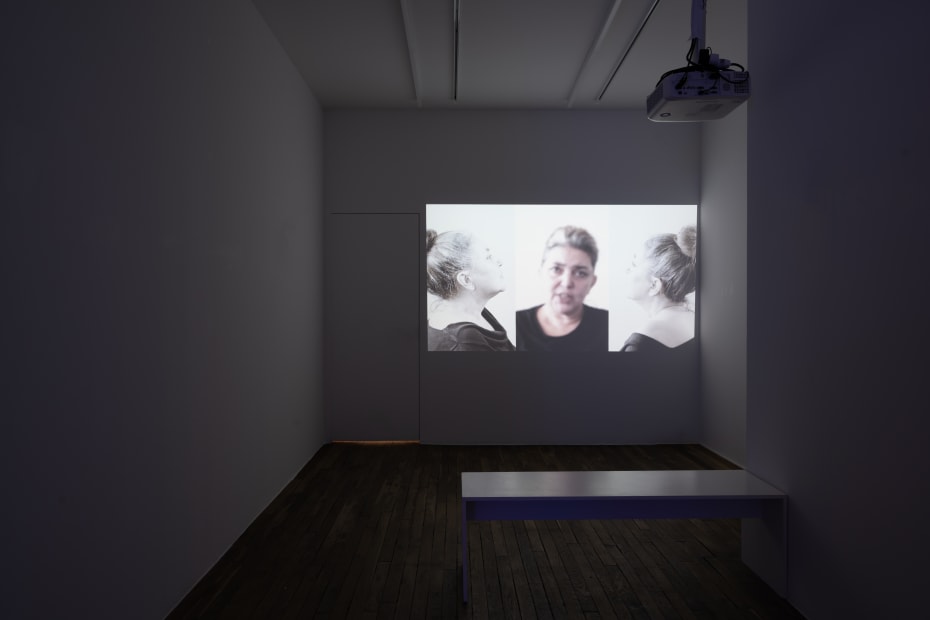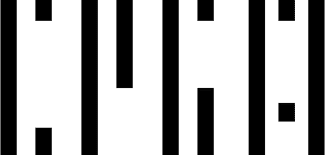Maja Bajević: Damaged GoodsGalerie Peter Kilchmann
Rue des Arquebusiers, Paris
Maja Bajević
Damaged Goods
Jan. 06 - Feb. 22, 2024
Opening: Friday, January 5, 6 - 8 pm
11-13 rue des Arquebusiers, 75003 Paris
Galerie Peter Kilchmann is delighted to present for the first time in Paris and for the fifth time with the gallery, Damaged Goods the new solo exhibition by Maja Bajević (*1967 in Sarajevo, Bosnia and Herzegovina; lives and works in Paris). This exhibition provides the artist with the opportunity to continue several ongoing famous series and engage them in dialogue with new works. Gathered into a new ensemble, the gallery showcases ceramic sculptures, neon lights, an installation, embroideries, a new video, and a set of paintings.
"Who admires ascends." * Empathy is at the heart of Damaged Goods: an expression that evokes both damaged goods and individuals who have experienced adversity. Bajević invites her audience to walk through heterogeneous artistic proposals that share a similar wish: to animate this feeling, this movement towards, in a spectator momentarily freed from the vicissitudes of their own existence. This allows the viewer to be absorbed by the history of women, immigrants and gives them the chance to carry away at least a little of the memory of those who have contributed so much to the preciousness and multiplicity of our worlds.
The luminous installations glow intensely, guiding the gaze almost counterintuitively to the ground. These works are deeply connected to the installation To Be Continued – We (2014), where Bajević collects slogans from major socio-political uprisings of the 20th century. The evocative power of these short phrases engages the viewer in a reading that summons both the political and the poetic. An Artist Who Has No Country Is No Artist (blown glass and neon, 52 x 104 x 9,5 cm, 2024) borrows its rhythm and prelude from Mladen Stilinović's work An Artist Who Cannot Speak English Is No Artist (1992). Whether working under the hegemony of a language (in the case of Mladen Stilinović) or producing while tied to a territory as our political systems maintain (in the case of Maja Bajević), the mechanisms of exclusion persist. This phrase is both a resigned expression and a protest. It crystallizes the episode of fracture in Bajević's existence, who, as an expatriate, joined the Beaux-Arts de Paris and became an immigrant, leaving her country in a choreography of all possibilities and remaining in France trapped in the grip of war, enduring the impossible return and the undeniable sense of loss. The difference is clear: the life of the expatriate plays with existence, while the existence plays with the life of the immigrant. Neo (blown glass and neon, 65 x 17 x 11 cm, 2024) raises the redundant question in Bajević's work of the autonomy of the work and its reception. The viewer follows the prefix to activate the meaning, the word first crossing the lips, saying much about its concerns: neosocialist, neofascist, neoliberal, neoromantic...
Socialists (embroidery on cotton, 100 x 148 cm, 2022) welcomes the viewer from the showcase. The work, gently swaying in the air, reiterates the words attributed to the German Protestant clergyman Martin Niemöller, who sympathized with National Socialism in the 1930s before becoming a figure of resistance. The poetic cadence of these few lines, like a refrain, certainly tells of guilt, remorse, personal responsibility but mainly makes it evident how often one must experience to develop an empathetic spirit. "First they came for the socialists, and I did not speak out—because I was not a socialist (...) Then they came for me—and there was no one left to speak for me."
The works of the ongoing series Art, Craft, and Facts were first shown at the All World's Futures exhibition at the Venice Biennale (2015). Embroidered graphics in shimmering threads unfold on cotton fabrics printed with floral patterns. The factor of time/labor invested in such activity contrasts intensely with the frenetic pace of our modern societies. These embroideries, often collaborative in Bajević's case, provide insights into statistics regarding the drastic disparities suffered by women compared to men, in terms of wages, recognition, and more recently, feelings. With Gap (embroidery on cotton, 89 x 130 cm, 2024), the powers and successes are inequitably distributed based on gender, both in the public and private spheres. Why don’t you love me anymore (embroidery on cotton, 81 x 115.5 cm, 2024) delves even deeper into the intimate. However, she is distinctly depicted higher than he, the constancy of her love that does not wane and moves according to a calm curve finally ensures her advantage.
These staggering figures also manifest in enameled ceramics with warm tones. The series titled L'Origine du Monde (ceramics, variable dimensions, 2024) conveys both shock and horror at contemplating these findings, as well as the absurdity and obsolescence of the kind of thinking that encourages and/or perpetuates these phenomena. The female attributes are the size of a fruit and fit in the palm of the hand. While undoubtedly frightening to be thus separated from entire bodies, these sculptures also playfully offer buttocks and lips, roundness and intimacy to the absurd signs that patriarchal societies want to engrave on them.
Two fans converse, two people exchange as one might witness in a therapy session. While one confides some of the reasons for their distress, the other encourages them to continue their confessions in an endless loop. You Take my Breathe Away (installation, variable dimensions, 2022) begins with the first whose voice is muffled, breath as if stifled. The second intervenes sparingly, only to not exhaust the dialogue; she renews the exchange, the breath, which appear necessary for the resolution of these afflictions. These secrets, these echoing thoughts, could very well be those of the many figures who have traversed and still traverse Bajević's work.
Similar to judicial identification photographs, Bajević's face is portrayed frontally and in both profile through three panels, with overlapping and merging voices. The text is recited by each of these faces in French, English, and German. In the work, I am sorry (single channel video, sound, color, complete version 23 min.), the artist reveals and confesses some of the regrets and anxieties of her journey. The tone is solemn, and as the portraits shift positions, it becomes evident that these apologies are not solely for the viewer but are also directed towards these alter egos speaking in different languages. Even if her home-country ?? no longer exists, there is still a need to be seen or heard to affirm their existence. Inevitably, much like a repetitive noise or a ubiquitous image that becomes insignificant due to familiarity, the silhouettes evade and dissolve into a blinding white light.
Marcelle Marcel, an alter ego, inhabits the world quite differently. Expatriate, she/he moves towards the destiny she/he creates with the ardor and all the freedom of youth. She/he is in a potential perpetual movement, she/he knows no boundaries, whether material or conceptual. The field of perspectives to explore is infinite, her/his freedom of action inexhaustible. No explicit protest from the student at the Beaux-Arts; she/he paints and takes, unreservedly, all the tools that sing to her/him, all the subjects that attract her/him. The colors of her neighbor, Maja Bajević's stamps, the wallpaper of the room that welcomes her/him, the covers of newspapers from the country where she/he momentarily set her/his suitcases. While her/his practice, painting, unfolds in intimacy, in a kind of inner world, this world still belongs entirely to her/him. The surfaces are populated with faces and silhouettes, a sample of the existences that cross her/his path. She/he does not criticize political realities; she/he observes and summons their signs, to distribute them on canvas, in a movement of generous joy (2024). Marcelle Marcel moves to the other side of the mirror, making tangible the generational rupture that distinguishes her/him from Maja Bajević.
* Victor Hugo, Utilité du beau.
Maja Bajević's works have been exhibited worldwide since the early 2000s. She has participated in the following biennials: Busan Biennale (2018), Sao Paulo Biennale (2015), Venice Biennale (2015), Thessaloniki Biennale (2013), Documenta (2007), Seville Biennale (2004), Venice Biennale (2003), Istanbul Biennale (2001), Manifesta (2000), as well as group exhibitions in renowned institutions such as Judd Foundation, New York (2023), PAC, Milano (2022), MAXXI, Rome (2021), and elles at the Centre Pompidou (2009), to name a few.
In 2025, the Moderna Galerija in Ljubljana, Slovenia, will dedicate a solo exhibition to her and in the year 2024, the Kunsthaus in Graz will present a monumental work on its facade.
Among her solo exhibitions are (selection): Galerie Peter Kilchmann (2022), Centre Culturel Jean Cocteau, Les Lilas, France (2022); Migros Museum für Gegenwartskunst, Zurich, Switzerland (2017); James Gallery, CUNY, New York, USA (2012-2013); Daadgalerie, Berlin, Germany (2012); Museo Nacional de Arte Reina Sofia, Palacio Cristal, Madrid, Spain (2011); National Gallery of Bosnia & Herzegovina, Sarajevo, Bosnia and Herzegovina (2006) and P.S.1 MoMA, New York, USA (2004).
Her works are part of the collections of the following institutions (selection): 21st Century Museum of Contemporary Art, Kanazawa, Japan; Centre Georges Pompidou, Paris, France; FRAC Franche-Comté, Dôle, and FRAC Pays de la Loire, Carquefou, France; MACBA, Barcelona, Spain; Moderna Museet, Stockholm, Sweden; Museo Nacional Centro de Arte Reina Sofia, Madrid, Spain; National Gallery of Bosnia and Herzegovina, Sarajevo, Bosnia and Herzegovina; Vehbi Koç Foundation, Istanbul, Turkey; Erste Foundation, Vienna, Austria; National Museum of Art, Architecture and Design, Oslo, Norway.
For further information, please contact Audrey Turenne: audrey@peterkilchmann.com or
Marina Hinkens: marina@peterkilchmann.com





